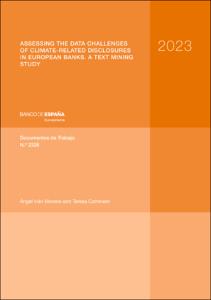Assessing the data challenges of climate-related disclosures in European banks: a text mining study
Autor
Fecha de publicación
26-sep-2023
Descripción física
23 p.
Resumen
El Grupo Intergubernamental de Expertos sobre el Cambio Climático (IPCC) estima que se debe alcanzar el objetivo de cero emisiones netas a escala global para el año 2050. A fin de conseguirlo, muchas empresas privadas se han comprometido a lograr las cero emisiones netas para 2050. El Comité Directivo de Datos Climáticos (CDSC) está trabajando en una iniciativa para crear un repositorio digital central global de divulgaciones climáticas que intente abordar los desafíos de datos actuales. Este documento evalúa el progreso de las instituciones financieras europeas en sus esfuerzos por superar los desafíos de datos descritos por el CDSC. Utilizando un enfoque de minería de textos, junto con la aplicación de modelos de lenguaje de gran tamaño (LLM) para la verificación de contexto, calculamos un Índice de Divulgación de Gases de Efecto Invernadero (GHGDI), analizando 23 divulgaciones muy específicas presentes en los informes ESG comprendidos entre 2019 y 2021 y pertenecientes a la mayoría de los bancos significativos bajo supervisión directa del BCE. Posteriormente se compara este índice con la puntuación otorgada por el Carbon Disclosure Project (CDP). Los resultados indican una correlación moderada entre aquellas instituciones que no informan al CDP cuando se les solicita y un bajo GHGDI. Las instituciones con una puntuación alta, por su parte, no guardan necesariamente correlación con un GHGDI alto.
The Intergovernmental Panel on Climate Change (IPCC) estimates that global net-zero should be achieved by 2050. To this end, many private firms are pledging to reach net-zero emissions by 2050. The Climate Data Steering Committee (CDSC) is working on an initiative to create a global central digital repository of climate disclosures, which aims to address the current data challenges. This paper assesses the progress within European financial institutions towards overcoming the data challenges outlined by the CDSC. Using a text-mining approach, coupled with the application of commercial Large Language Models (LLM) for context verification, we calculate a Greenhouse Gas Disclosure Index (GHGDI), by analysing 23 highly granular disclosures in the ESG reports between 2019 and 2021 of most of the significant banks under the ECB’s direct supervision. This index is then compared with the CDP score. The results indicate a moderate correlation between institutions not reporting to CDP upon request and a low GHGDI. Institutions with a high CDP score do not necessarily correlate with a high GHGDI.
The Intergovernmental Panel on Climate Change (IPCC) estimates that global net-zero should be achieved by 2050. To this end, many private firms are pledging to reach net-zero emissions by 2050. The Climate Data Steering Committee (CDSC) is working on an initiative to create a global central digital repository of climate disclosures, which aims to address the current data challenges. This paper assesses the progress within European financial institutions towards overcoming the data challenges outlined by the CDSC. Using a text-mining approach, coupled with the application of commercial Large Language Models (LLM) for context verification, we calculate a Greenhouse Gas Disclosure Index (GHGDI), by analysing 23 highly granular disclosures in the ESG reports between 2019 and 2021 of most of the significant banks under the ECB’s direct supervision. This index is then compared with the CDP score. The results indicate a moderate correlation between institutions not reporting to CDP upon request and a low GHGDI. Institutions with a high CDP score do not necessarily correlate with a high GHGDI.
Publicado en
Documentos de Trabajo / Banco de España, 2326
Materias
ESG; Sostenibilidad; Medio ambiente; Cambio climático; Emisiones de carbono; Procesamiento de lenguaje natural; Desafíos de datos climáticos; ChatGPT; Text-bison; ESG; Sustainability; Environment; Climate change; Carbon emissions; Natural language processing; Climate data challenges; OpenAI’s ChatGPT; Google’s text-bison; Recursos naturales y medio ambiente; Big data e inteligencia artificial; Instituciones crediticias de depósito; Zona euro
Aparece en las colecciones:












